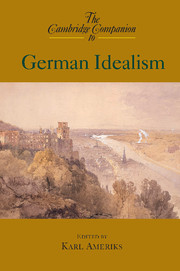Book contents
- Frontmatter
- Introduction
- 1 The Enlightenment and idealism
- 2 Absolute idealism and the rejection of Kantian dualism
- 3 Kant’s practical philosophy
- 4 The aesthetic holism of Hamann, Herder, and Schiller
- 5 All or nothing
- 6 The early philosophy of Fichte and Schelling
- 7 Hölderlin and Novalis
- 8 Hegel’s Phenomenology and Logic
- 9 Hegel’s practical philosophy
- 10 German realism
- 11 Politics and the New Mythology
- 12 German Idealism and the arts
- 13 The legacy of idealism in the philosophy of Feuerbach, Marx, and Kierkegaard
- Bibliography
- Index
13 - The legacy of idealism in the philosophy of Feuerbach, Marx, and Kierkegaard
Published online by Cambridge University Press: 28 May 2006
- Frontmatter
- Introduction
- 1 The Enlightenment and idealism
- 2 Absolute idealism and the rejection of Kantian dualism
- 3 Kant’s practical philosophy
- 4 The aesthetic holism of Hamann, Herder, and Schiller
- 5 All or nothing
- 6 The early philosophy of Fichte and Schelling
- 7 Hölderlin and Novalis
- 8 Hegel’s Phenomenology and Logic
- 9 Hegel’s practical philosophy
- 10 German realism
- 11 Politics and the New Mythology
- 12 German Idealism and the arts
- 13 The legacy of idealism in the philosophy of Feuerbach, Marx, and Kierkegaard
- Bibliography
- Index
Summary
The leading figures of the generation that came to philosophical maturity in the 1840s stressed, from the start, their sharp disagreements with the systematic idealism of their predecessors. As Søren Kierkegaard's pseudonymous author Johannes de Silentio makes clear in Fear and Trembling, the one thing that he is not writing is “the System,” that is, any version of Hegelian idealism. Ludwig Feuerbach and Karl Marx could have said the same. Their followers, to this day, understandably emphasize those aspects of their heroes' work that take them so far away from German Idealism that they can appear to be an attempt to “leave philosophy” altogether and to replace it with radical critique, revolutionary activism, and rigorous empirical science. In addition, all three thinkers agree on the charge that most of German Idealism, like much of modern philosophy in general, can be dismissed as little more than an alienating effort to carry out theology by other means. Their agreement on this point is all the more remarkable since it arose despite obvious and deep disagreements: Feuerbach and Marx came to bury all religion, whereas Kierkegaard aimed to rejuvenate it by calling for a return to Christian orthodoxy.
- Type
- Chapter
- Information
- The Cambridge Companion to German Idealism , pp. 258 - 281Publisher: Cambridge University PressPrint publication year: 2000
- 3
- Cited by

